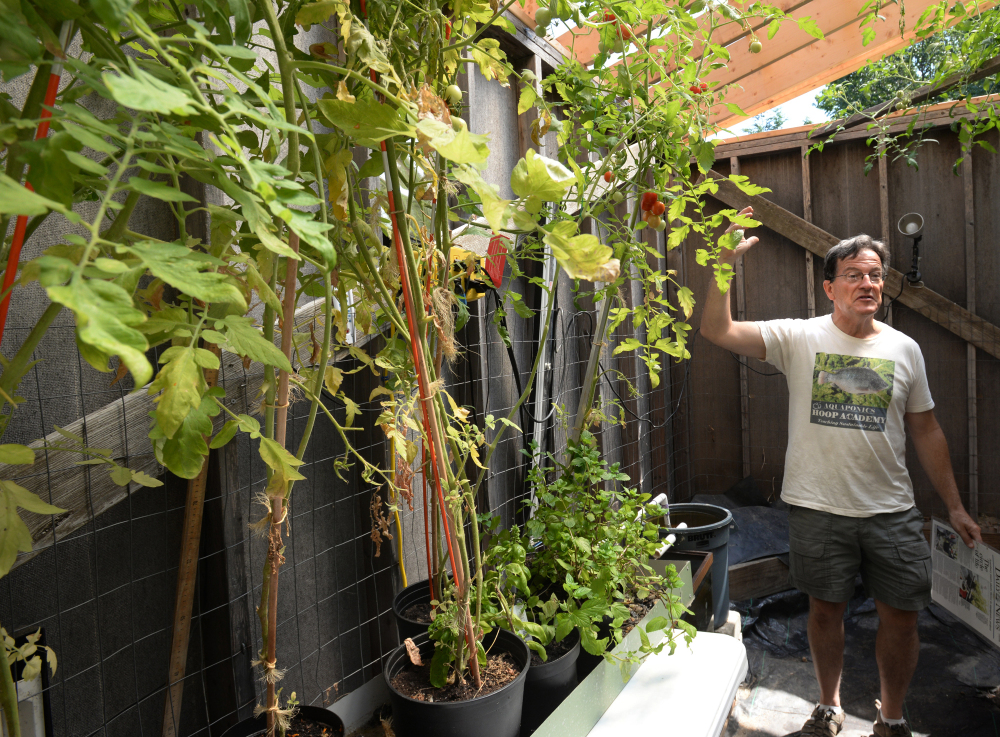AMESBURY, Mass. — With local cities and towns putting water bans into place at an alarming rate this month, Ed Tivnan would like everyone to know the state of his garden.
“My garden has never been better, it’s always watered,” Tivnan said. “But the chipmunk is getting at it more than I would like it to be. I have to get up early in the morning to keep the chipmunk away. I’ve got the only tomatoes around.”
The chipmunks have been able to gorge on tomatoes in the middle of this summer’s severe drought at Tivnan’s Amesbury farmhouse, where Tivnan has grown 20 over 9-foot-tall tomato plants in an old woodshed converted into an unheated hoop house. Inside the hoop house, more than 180 gallons of water circulates through a 16-by-4-foot aquaponics table known as the Aquaponics Academy.
“The method we use has a continuous flow,” Tivnan said. “The plants always have access to the water, and they always have the ability to hydrolyze. Because I am circulating the water, I am actually reusing it in a sustainable way. For the amount of vegetables I get versus conventional gardening, I am using 80 percent less water.”
Tivnan, or “Aqua Eddie” as he is more commonly known, two years ago built a similar aquaponics table in a hoop house at Cider Hill Farm, where fancy goldfish – Tivnan calls them his “chemical engineers” – live and excrete ammonia with their metabolic waste. The ammonia then circulates with the dirty water into a year-round garden, eventually converting into nitrates, which the many different plants Tivnan grows crave.
“All I’ve done is put more water in the fish tank and let the system do the rest,” Tivnan said. “This is the most sustainable way to garden in the country.”
A certified teacher and an education consultant for Grove Labs in Somerville, Tivnan spent the past school year teaching advanced placement biology at Pentucket High School. He also set up three 8-foot-by-16-inch aquaponic tables at Gloucester’s O’Maley Innovation Middle School, making it the first school in the state, Tivnan said, to have an after-school hydroponics program.
“This is not only a great way to teach chemistry, this is not only a great way to teach biology, this is not only a great way to teach science, technology and engineering, it is also a great way to teach social studies,” Tivnan said. “It’s great to talk about the origin of different fruits, vegetables and herbs as well as where they came from. It reflects civilization and how things have changed.”
Thanks to a $10,500 grant from the Gloucester Education Foundation, Tivnan was able to provide the O’Maley school with year-round strawberries, eggplant, onions, watermelon, tomatoes, peppers, hot peppers, basil, oregano, winter squash, rosemary and more.
“The students’ favorites are the carrots,” Tivnan said. “In fact, I had students tell me the aquaponics carrots taste better than candy bars. They are sweet, and when they are as fresh as they are, they are the sweetest.”
The aquaponic tables also taught a lesson in economic sustainability via a plant sale held at the school, which raised roughly $600 to go to the O’Maley school’s gardening club.
“Nature is the real science class,” Tivnan said. “And this is the best exhibit of natural sustainability you can find in any classroom.”
Teaching aquaponics, which Tivnan does with teachers at the O’Maley school, also fits perfectly into the state’s next-generation science and technology/engineering education standards.
“This is a living exhibit,” Tivnan said. “Good teaching requires that the children have hands-on experience. And there is no better hands-on experience than touching and experiencing living organisms, and what is even better is teaching them a sense of awe in nature. This is where the education of science needs to be reinvented. If we teach our students the science, their awe of nature increases. The life above us is great, but below your feet there is even more in the soil.”
With his tables creating new life in Gloucester, Tivnan said that he hopes to expand their reach closer to home very soon.
“We would love to do professional development in new schools and to help them with the new Massachusetts science curriculum,” Tivnan said. “Water conservation is a big deal right now. But right behind it is chemical runoff. You have Lake Attitash looking ‘ewww.’ That is because of all of the extra growth hormones and fertilizers that people are putting on their lawns, and when it rains, it runs into the water. This has no runoff.”
Send questions/comments to the editors.



Success. Please wait for the page to reload. If the page does not reload within 5 seconds, please refresh the page.
Enter your email and password to access comments.
Hi, to comment on stories you must . This profile is in addition to your subscription and website login.
Already have a commenting profile? .
Invalid username/password.
Please check your email to confirm and complete your registration.
Only subscribers are eligible to post comments. Please subscribe or login first for digital access. Here’s why.
Use the form below to reset your password. When you've submitted your account email, we will send an email with a reset code.